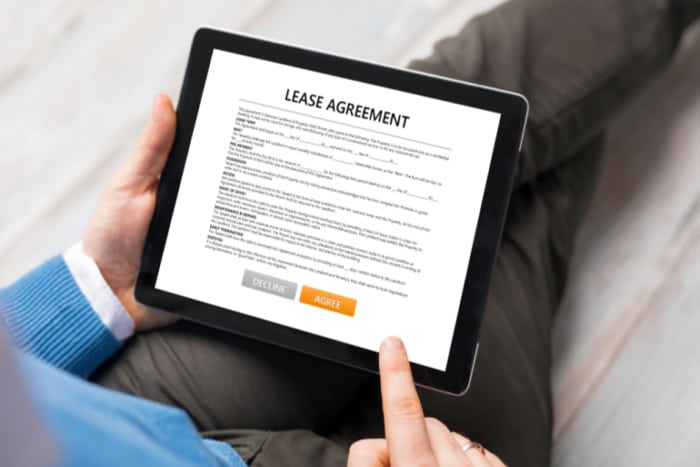
Having the right contracts is an important part of your business!
If you’re just starting out in your self storage business you might be unsure about what kind of contracts you need. One of the most used contracts in self storage is the Lease Agreement.
Lease agreements are a common feature in today’s marketplace. You’ve probably signed a lease agreement before, whether it was for a car, house, or business property. Not everyone knows the ins and outs of a lease contract, though. While there are many contract experts who can help, it’s also perfectly possible to write a legally viable lease agreement yourself.
What Do We Mean by Lease Agreement?
A lease agreement sets out the terms for leasing goods between two parties. There are many types of leases. We’re focusing on commercial property leasing. In this sense, a lease defines the period a property is rented for, the rules for landlords and occupants, and the price.
You may wonder what the difference is between a lease and a rental. The truth is, there is no real difference other than the terms of the agreements. In the world of contracts, a lease usually refers to a longer-term rental (more than 30 days).
Making Your Storage Unit Lease Agreement Legal
When you’re scaling a business, it’s important to know when you need outside help. You should try consulting with a local legal practitioner. They’ll be able to tell you the laws and specific local ordinances you’ll need to take into account.
The specific laws that cover landlord-tenant agreements will vary depending on where you are. As well as national level laws governing property ownership, each state or local area will have its own rules.
These laws will cover things like landlords’ and occupants’ rights, security deposit protection, contract violations and dispute settlement, property access, and handling late payments.
How to Write a Lease Agreement
Once you have a grasp of the local lease laws, you’re ready to write your lease agreement. Here are the main components you’ll need in your contract. Remember, if you’re struggling to cover all the requirements, local contract lawyers will be able to assist you. There are also a number of online template options.

1 Information for All Involved Parties
You will need to get the names, addresses, and contact numbers of anyone involved in the lease. That includes you (lessor) and any other property owners, and the occupants (lessee). It also includes any property management companies or agents that will manage the property.
The initial section of the document should also include the date the contract was made. In a commercial contract, you will also need to state the property title, rental price and payment date, start date of the rental, and the assigned storage unit numbers.
2 Standard Provisions
These are the standard stipulations of the rental contract. This will include the legal definition of the rental and the terms (i.e., month to month). This will also state the exact rules for the use of the property. For example, a standard storage unit lease agreement would define what the storage unit would be used for as well as what it may not be used for, such storing illegal items. The nature of the business is important to commercial contracts. Whether that’s a minor difference like sales or revenue operations being carried out, it should be stated.
This section of the document will also set out the provision of insurance on the contents. In the case of tenants, this would be tenants’ insurance. In the case of a storage unit, the goods insured and the maximum amount are covered in the policy.
Standard provisions also outline what will happen in the case of defaulted payments. This will include terms for resale of the property after default, as well as any rights the lessor has over goods left by the lessee.
3 Utilities and Services
Any services offered with the property must be outlined in the lease. For example, security provisions or cleaning services.
This could include more varied services depending on the agreement. Take the example of a storage company renting commercial space for online retailers. They might offer the use of stock-tracking software to help calculate metrics like monthly sales or average order value eCommerce businesses need to monitor performance.

4 Monthly Payment, Due Date, and Collection Method
Agree with the occupants on where payment should be made and when. You’ll need to record these details in the lease. This should list the address and bank details of your business. Alternatively, if any third party is used to collect a payment, their details should be used.
5 Additional Fees
Itemize any additional fees beyond the rent that the occupant will pay and their amounts. This can include security deposits, lock fees if you provide locks for the storage units, invoice charges, and new account fees.
6 Rights and Obligations (For Occupants and Owners)
This section of the document sets out the full rights and obligations of the owner and occupants. There are many areas to cover, so we’ll break it down into sections.
Right of Access/Entry
The rights of access outline who has access to the property. This could be the owner, occupants, or any other authorized parties. If special access rules are in place, such as limiting who can access the property at certain times, these should also be described.
The right of entry is a declaration that the property owner shall have access to the property at all times. If there are rules in place regarding notice periods, these should be listed too.
Indemnification
You will need to outline the occupants’ responsibility to indemnify the owner. This means the occupants’ liability for any damage to the property, or harm caused.
As-Is Condition
This is a standard clause that will be included in most storage unit leases. It confirms that the unit is supplied in the condition described when rented. It also confirms the occupants’ right to modify (usually, this will be prohibited for storage units).
Termination
Set out the terms for termination of the contract. For example, the contract may be terminated by a written agreement between both parties. You should also state the required notice period, i.e., 30 days from the date of notification/agreement.
Abandonment
List the owner’s right if the property is abandoned by the occupants. Also, define what constitutes abandonment. For example, if the property is left unlocked for two business weeks.
Changes to the Contract
A lease agreement has to include a provision for changing the terms of the contract once signed. This will normally be with the written consent of any involved parties.

7 Legal Clauses
There are several other standard legal clauses that must be included. These will vary depending on the type of lease. Sticking with our storage unit rental example, you’d include legal fee entitlement, unenforceability clause for voiding invalid agreement terms without voiding the contract, statement of a legally binding agreement, adherence to governing laws, and a jury trial waiver.
Review the Agreement
Once the self storage lease agreement has been written, both parties need to review and agree to the terms. At this point, you may want to verify the storage unit contracts with a solicitor or a virtual law firm. Once the self storage contract is agreed upon, all parties need to sign it.
Succeed with Self Storage Solutions from 6Storage
Storage unit lease agreement can be complicated. Don’t be afraid to reach out for professional help. You can save your business time and money by being able to create these documents internally, though. Learning the storage unit contracts requirements your business deals with can only benefit the company.

Owning and operating self storage facilities requires a strong foundation in order to succeed. Accelerate achievements with smart self storage solutions.
From Mac-supported, cloud-based self storage management software to a reliable remote gate access system, 6Storage offers user-friendly support to the self storage industry. In addition, 6Storage offers website services and an advanced storage calculator. We back up all of our services with 24/7 live chat support.
If you’re looking for affordable self storage solutions designed by industry experts offered at competitive prices, look no further than 6Storage! Contact us to level up your storage business and experience our white-glove service.






